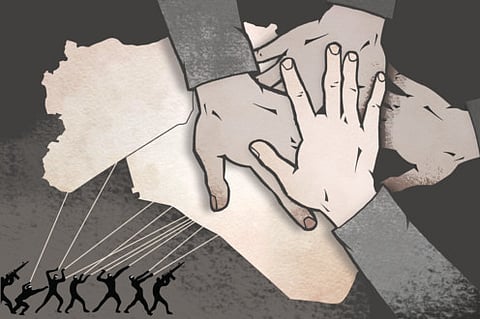Arab alliance takes lead in fighting Daesh
It will support a return to stable national institutions in countries destroyed by civil war

The emerging alliance between GCC states and Egypt is seeking to create a united Arab force in the Middle East that can articulate the needs of the Arab people and stand against the manipulations of Iran and Turkey, both of which have been seeking short-term gains from the region’s chaos and sectarian strife.
Many of the other nations that were former leaders of the Arab world have disintegrated into civil war and are, therefore, unable to take a lead in restarting normal governance in the region. It has been the Gulf states, led by the UAE and Saudi Arabia, that have worked with Egypt to build the new alliance’s political and economic goals. It is an indication of the urgency of their task that three countries with such diverse backgrounds can find common cause so easily.
On the economic side, they have emphasised the importance of governments nurturing prosperity so that people can build their careers and work on realising their personal and family ambitions.
Fighting Daesh
On the political side they have prioritised the fight against Daesh and extremism, while also seeking a return to nation states run by national governments in those areas being destroyed by civil war. The emerging Arab alliance is willing to work closely with international partners in the military side of its work, and the GCC states are already important players in the global economy and so have a wide range of international economic partners, which they are anxious to share with Egypt.
The challenge the Arab states have is to avoid letting these international links dominate any political and religious elements in their work, which have to remain firmly local or national to retain their legitimacy.
This is perfectly possible but memories of George W. Bush’s failures in the aftermath of the then-coalition’s invasion of Iraq have soured Arab perceptions of international support, making the task that much harder.
Al Azhar makes the case
The religious case for rejecting Daesh and all it stands for was reiterated last week by Al Azhar’s Grand Imam Ahmad Al Tayeb, when he linked extremism to “bad interpretations of the Quran and Hadith”.
At a counter-terrorism conference in Saudi Arabia he called for all authorities across the Islamic world to reform their religious education institutions to contain the spread of religious extremism.
“There has been a historical accumulation of excessive trends” that have led some people to embrace a misguided form of Islam, he told the gathering. He added that the only hope for the Muslim nation to recover unity is for its schools and universities to challenge the new trend of accusing Muslims of being unbelievers, which is a grave insult in Islam.
Al Tayeb went on to make the political point that extremism creates sectarian divides among Arabs, which are being exploited by international forces, and blamed the unrest in the region on a conspiracy by what he called “new global colonialism allied to world Zionism”, which has exploited “confessional tension” in conflict-hit Iraq, Syria, Yemen and Libya. Saudi Arabia’s new King Salman Bin Abdul Aziz gave a statement to the conference that called for “an efficient strategy to combat terrorism, which is a scourge that is the product of extremist ideology”.
UAE speaks up
The UAE has been a forceful member of the movement against Daesh. In September 2014 His Highness Shaikh Mohammad Bin Rashid Al Maktoum, Vice-President and Prime Minister of the UAE and Ruler of Dubai, spoke of the importance of winning the intellectual battle against Daesh, as well as the military struggle.
He listed three areas of action against the “barbaric and brutal organisation”. First, he emphasised the importance of countering malignant thinking with enlightened thought and open minds, tolerance and appreciation of our differences. Second, he insisted that governments have a duty to create stable institutions that can deliver real services to their people. And thirdly, he said it was urgent to address the black holes in human development than afflict many areas in the Middle East.
UAE at White House
More recently, last week the UAE was a key participant at US President Barack Obama’s White House Summit on Countering Violent Terrorism, where Dr Anwar Gargash, Minister of State for Foreign Affairs, said that “dismantling Daesh and the hateful ideology that informs it is one of our most urgent and important goals in the fight against violent extremism”.
He listed five specific action areas in the fight against Daesh, and the one he described as the most vital was the need to show that Daesh offers no answers to the crucial questions of our time and region. “Despite its claims, Daesh is unable to provide the effective governance, economic opportunities or the social services that people in the Arab world crave and deserve,” he said.
The other four areas were to refuse to give Daesh the recognition that using the word Islam in its name might give the group; to highlight the failure and weakness that Daesh is experiencing in running the territory it has seized; to display unwavering unity against Daesh and not to be distracted by sectarian differences; and to find the right balance between protecting the values of free speech while also respecting Islamic religious values.
“This undermines any claim Daesh might make that it is acting as a protector of Islamic values,” Gargash said.



